On the 2-3 June 2021, United for Efficiency (U4E) hosted a series of workshops on Sustainable Public Procurement (SPP) for lighting and cooling appliances.
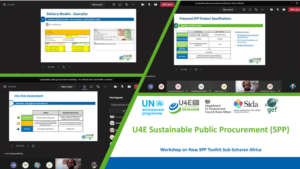 SPP is a process whereby public sector organisations meet their needs for goods and services in a way that achieves the best value for money on a whole life basis for the organisation and society. Three dimensions – environmental, social and economic – form the pillars of an SPP programme.
SPP is a process whereby public sector organisations meet their needs for goods and services in a way that achieves the best value for money on a whole life basis for the organisation and society. Three dimensions – environmental, social and economic – form the pillars of an SPP programme.
The events gathered 57 participants, including 39 government officials and regional organizational representatives in the Sub-Saharan and Asia-Pacific regions, who shared their experiences on procurement modalities, technologies, and assessment criteria.
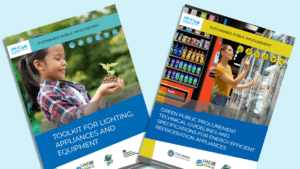 U4E presented its newly developed SPP Toolkit for Lighting, Appliances and Equipment. It is composed of a guidance document and accompanying Excel spreadsheet tool to run hypothetical procurement scenarios. It allows officials to assess the environmental, social and economic benefits of an SPP project to help make a solid business case. The Toolkit contents incorporate U4E’s Model Regulation Guidelines and Green Public Procurement Technical Guidelines and Specifications.
U4E presented its newly developed SPP Toolkit for Lighting, Appliances and Equipment. It is composed of a guidance document and accompanying Excel spreadsheet tool to run hypothetical procurement scenarios. It allows officials to assess the environmental, social and economic benefits of an SPP project to help make a solid business case. The Toolkit contents incorporate U4E’s Model Regulation Guidelines and Green Public Procurement Technical Guidelines and Specifications.
Governments are instrumental in transforming their markets for appliances. For example, Malaysia is targeting to cover 20% of government purchases with ‘Green’ products, and in Singapore, public sector agencies are required to procure the most cost-effective appliances, taking into account life cycle costs. In these examples, officials are going beyond traditional minimum energy performance standards (MEPS) and energy labels that ‘push’ the overall market towards products that waste less energy by also addressing chemicals used in the equipment, noise, light pollution, and other more holistic considerations.
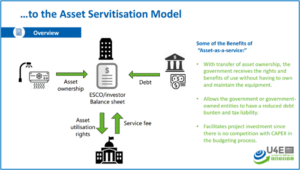 SPP offers a complementary ‘pull’ by leveraging the purchasing power of governments to generate demand for sustainable products and services. In Sub-Saharan Africa and Asia-Pacific countries, public expenditure accounts for nearly a quarter of their gross domestic product (GDP), and some countries have already set ambitious targets to dedicate a minimum of their purchases to sustainable and/or environmentally friendly products.
SPP offers a complementary ‘pull’ by leveraging the purchasing power of governments to generate demand for sustainable products and services. In Sub-Saharan Africa and Asia-Pacific countries, public expenditure accounts for nearly a quarter of their gross domestic product (GDP), and some countries have already set ambitious targets to dedicate a minimum of their purchases to sustainable and/or environmentally friendly products.
U4E will provide technical assistance to several governments that participated in the workshops to pilot SPP best practices, and then share their findings to encourage broader uptake of successful approaches.
For further information, please contact hao.wu@un.org,or click here to access the webinar materials.
Leave a Reply